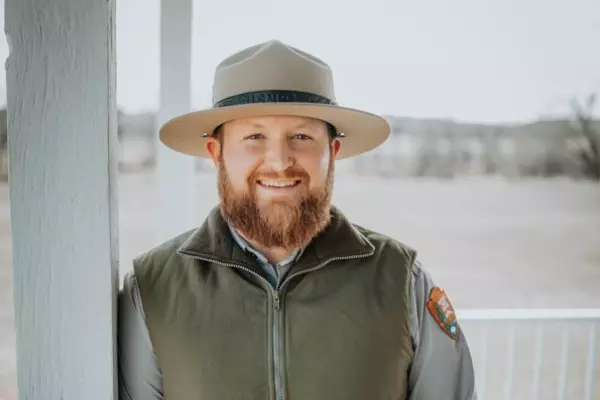
MAHG grad named first site manager of Colorado historical site
Unlike many students who have gone through Ashland University’s Master of Arts in American History and Government program (MAHG), Chris Mather isn’t a social studies teacher.
Mather works for the National Park Service (NPS).
“While the MAHG program is generally focused toward secondary school social studies teachers, I believe this program can be a benefit to anyone who is involved with government functions, acts as a steward to our public resources or has a general interest in American history and politics,” said Mather, who earned his MAHG from AU in 2017.
In May, the NPS selected Mather as the first permanent site manager of Amache National Historic Site (AMCH) in southeast Colorado. He will be responsible for managing the daily operations and staff of the newly authorized national historic site, which was one of 10 incarceration sites established by the War Relocation Authority during World War II to detain Japanese Americans forcibly removed from the West Coast, according to a news release from the NPS.
“We are excited to welcome Chris as Amache National Historic Site’s first site manager,” High Plains Group Acting Superintendent Janet Federick said in the news release. “Chris brings extensive experience in cultural and natural resources. Throughout his career, Chris has worked closely with several agency, university and partnership stakeholders and will be a strong leader as the park moves into the next stage of National Park Service management.”
The High Plains Group oversees three national historic sites in southeastern Colorado, including Amache, as well as Capulin Volcano National Monument in northeastern New Mexico.
While he has “officially” been working as the Amache site manager since May 21, Mather said he began engaging with stakeholder groups and participating in many public meetings related to the park’s foundation document last spring.
The foundation document relies heavily on the input and discussion with the stakeholders, which includes members of the local, regional and state community; indigenous-affiliated tribes and members of the Japanese American community, according to Mather.
“I joined the Amache project at a unique time,” Mather said. “The excitement around the site’s designation and the overwhelming support from the community puts AMCH in a great position to be successful.
“Most recently, NPS staff participated in the annual Amache Pilgrimage event, which typically takes place the weekend prior to the Memorial Day holiday,” added Mather, who has worked for the NPS for nearly 13 years, going to Amache from Fort Laramie National Historic Site in Wyoming, where he was the cultural resources program manager.
Mather started his NPS career at Grant-Kohrs Ranch National Historic Site in Montana. Agate Fossil Beds National Monument in Nebraska and Yellowstone National Park in Wyoming are two other places Mather has worked at with the NPS.
Before earning his master’s from AU, Mather graduated from the University of Idaho with a major in anthropology and a minor in history.
Mather said one of the reasons he chose Ashland for his master’s was the flexibility its MAHG program provides to working professionals like him with hybrid online and on-campus options. He added that he also selected it because the bulk of the program is strictly content-based and taught by a variety of distinguished faculty.
“Exploring the content and the uniqueness of each course broadened my own understanding of historical texts and events,” Mather said. “Additionally, I developed a better understanding of expectations when working with educators to create specific content that could be used in the classroom.
“As with many positions in the NPS, much of it relates to the preservation of our nation’s resources and history,” Mather added. “Being able to communicate that to the public is extremely important to the success of the NPS mission.”
Not only does Mather recommend AU’s MAHG program for anyone in public education, but he also said others like him who work in public history should see what the program has to offer and how they might be able to benefit from a class or seminar to enhance their own knowledge and understanding of American history.